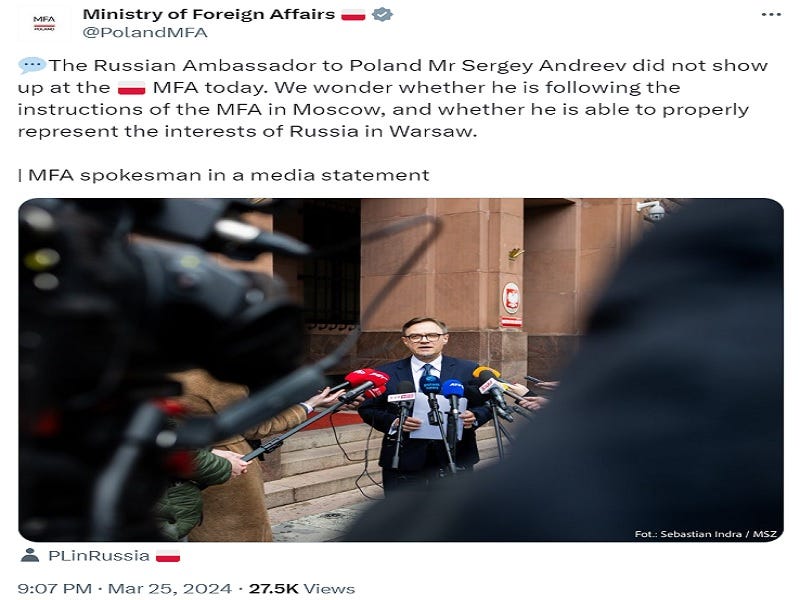The Russian Ambassador Gave Poland A Dose Of Its Own Diplomatic Medicine By Snubbing His Hosts
Regardless of whatever one might think about who’s right and who’s wrong in these cases, the fact is that Russia isn’t letting the EU and especially Poland get away with disrespecting it anymore, and it’ll likely always respond in a tit-for-tat fashion from here on out.
Poland is furious after Russian Ambassador Sergey Andreev refused a summons by his hosts to discuss the recent allegation that a Russian missile briefly passed into Polish airspace from Ukraine. He explained his decision afterwards by the fact that “Since I understood from the response of my Polish colleagues that there would be no evidence this time as well, I decided that in this situation the meeting would be pointless and declined the invitation.”
Polish Deputy Foreign Minister Andrzej Szejna reacted by accusing Ambassador Andreev of “deserting his diplomatic post”, which he described as “a violation of international law” and “a cause of concern for our allies.” This harsh rhetoric suggests that hawkish factions in Warsaw might be plotting to exploit this development as the pretext for further worsening diplomatic relations with Moscow, to say nothing of this becoming the basis upon which another round of anti-Russian information warfare could be waged.
What neither Szejna nor his Mainstream Media allies mentioned, however, is that Ambassador Andreev simply gave Poland a dose of its own diplomatic medicine after that country’s ambassador to Russia and his fellow EU counterparts refused a summons by their hosts to discuss pre-election meddling. The EU Mission in the country justified this decision as being due to those diplomats not wanting to be “lectured” by Russia, which is essentially the same reasoning that Ambassador Andreev just gave too.
Just like former President and incumbent Deputy Chair of the Security Council Dmitry Medvedev demanded that Russia’s ties with the EU be demoted in response, so too will his hawkish Polish counterparts likely demand the same, though it can’t be taken for granted that either side will do so. The preceding hyperlinked analysis explains some of the reasons why Moscow didn’t follow Medvedev’s advice, which are also relevant with respect to Warsaw as well.
Speculation about the future of their ties aside, what’s most important about this latest development is that it proves Russia’s willingness to diplomatically respond in a tit-for-tat fashion to disrespect from its Western counterparts, especially those from Poland. Russia just designated a partially government-financed “NGO” as “undesirable” less than two weeks after the latest presidential elections in a move likely connected to its alleged meddling in the run-up to those polls.
That “NGO” could have been discussed during the Russian Foreign Ministry’s summoning of the European Ambassadors in Moscow earlier in the month but none of them showed up, including the Polish one, thus leaving the state with no choice but to restrict its activities since it wouldn’t stop meddling. It therefore makes sense that Poland would be the first country where Russia gives the EU a dose of its own medicine, both due to Polish meddling via that “NGO” and the recent missile incident.
Had it not been for the Polish Ambassador earlier snubbing his Russian hosts, then the Russian one might not have snubbed his Polish hosts, and he could have instead attended the meeting in spite of the lecture that he would have predictably heard. Regardless of whatever one might think about who’s right and who’s wrong in these cases, the fact is that Russia isn’t letting the EU and especially Poland get away with disrespecting it anymore, and it’ll likely always respond in a tit-for-tat fashion from here on out.




